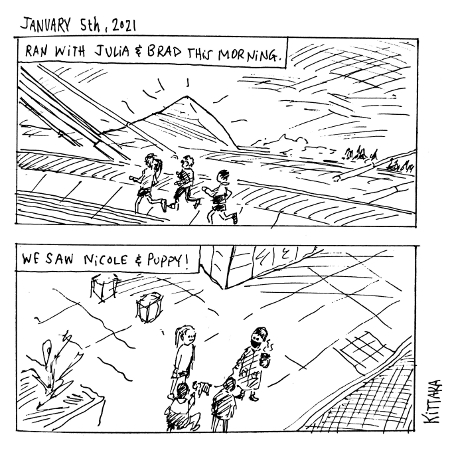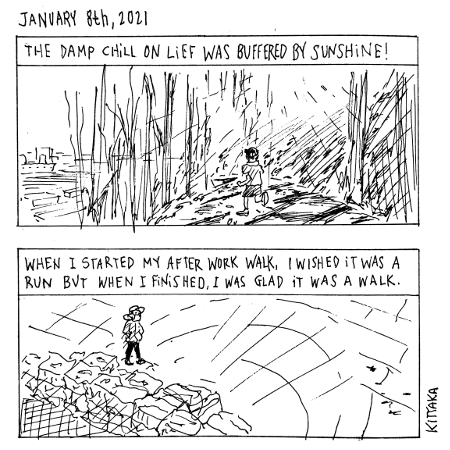(Friday, January 1st - Friday, January 15th)
On the final day of 2020, I ran Wildwood End to End (WWE2E) which is just a tiny bit over 30 miles. This wasn’t a planned half marathon key workout and I probably didn’t do the best job recovering from it. Despite those things, it got me excited about racing a marathon (and beyond) again, so beyond this cycle, it was a good addition.
I was pretty sore on January 1st, but I wanted to try to get a run in since I was pretty much sitting at home over the holiday weekend. I was on good behaviour for just that day before jumping back onto an 8+ miles per day pace. I remember telling Julia and Brad on a run that I had bounced back and forth between feeling great and feeling sore on my runs the week following WWE2E and was struggling to keep the pace under control on days when I felt good.

Even with this knowledge, I took my good days as a sign that my body was ready for a workout so a week after WWE2E, I did 4 x 3k with Dan M. I was basically locked into 6:00/mi pace for this workout which like earlier workouts is pretty far off of my original goal, but was a decent effort. This workout along with the 7 mile tempo at 6:08 average that I had done a couple of weeks prior are the core workouts of my half marathon cycle so it was time to reevaluate my now very lofty goal of 1:13:30 (5:36/mi). I adjusted my goal to 1:17:33 (5:55/mi) which I had run about a year prior. Training a year ago hadn’t been going particularly well either so I figured I had a shot at eclipsing that past self.
I’ll cover my track half marathon itself in a separate recap, but looking back on my training, I shouldn't have been doing as much volume; in the 16 weeks prior, I averaged 72 miles per week including a week where I only ran 7 miles. I also think that I was probably running too fast on my easy and recovery runs. These two factors prevented me from ever getting anywhere close to training at my goal half marathon pace in all but a few workouts. Reflecting on this further, I am seeing for the first time that dissatisfaction in my training for the past two years prevented me from proactively adjusting my volume.
Following my London Marathon 2019 cycle, I felt my level of training was lacking. I hadn’t gotten up to the string of 90+ mile weeks that I had done for NYC 2017 and Tokyo 2018. Thanks to good training with DWR teammates and some really fast shoes, I was able to run well at both the Copenhagen and Indy Monumental Half Marathons in the fall of 2019, but I didn’t acknowledge how good my training had been. My perspective was by using fancy shoes and piggy-backing on my teammates workouts, I was taking the “easy” way out. This is super conceited and embarrassing. It also completely misses the point of teamwork which intellectually I agree with, but struggle to accept. I think Eluid Kipchoge says it well, “one hundred percent of myself is nothing compared to one percent of the whole team.” Relying on others to get the best out of yourself isn’t weakness, it’s a strength.
My feelings of dissatisfaction with my training only became worse in 2020. In early 2020, just a few months after Indy, I was working in London and struggling to run 60 miles per week on my own. Later in 2020, despite eventually finding a good cadence with weekly track workouts with friends in Portland, I still felt like my training wasn’t “enough” unless I ran over 75 miles per week and even then, this was just a stepping stone to even higher volume. Ultimately, my training did not feature enough recovery and fast running to achieve my goal.
What I am taking away seems basic, but is difficult for me to accept:
- Be realistic with your starting point, don’t compare yourself to the past or other people
- Be satisfied with correct training: challenging and increasingly specific stress with appropriate rest
- Relying on others isn’t weakness, it’s a strength

Bonus: Setting specific sleep, fueling, hydration, strength, and mobility goals was helpful. In the past, I shied away from setting specific goals for these things as part of training cycles, but this time around found specifics helpful.